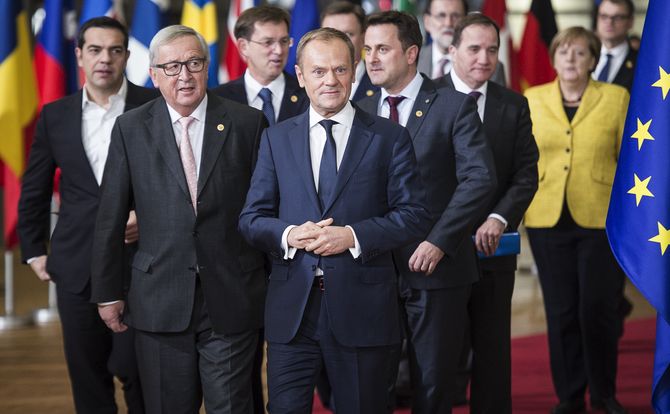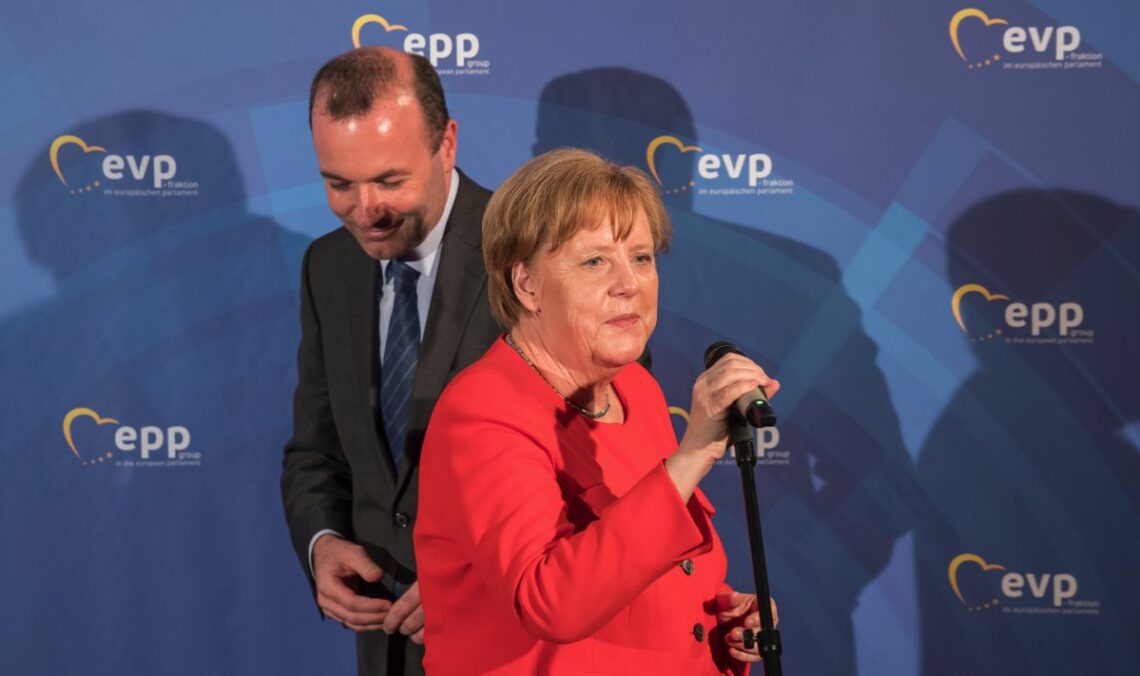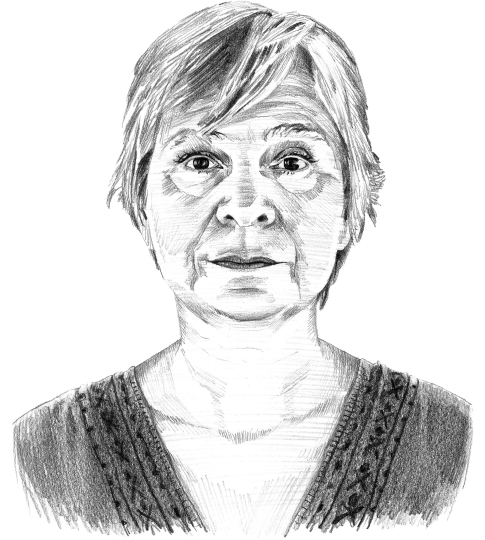A year of change for the European Union?
In 2019, the EU will be changing the leadership of its leading institutions over the next few months. Candidates are already jostling for a position to take over, and surprises could be in store. With non-mainstream parties likely to gain seats in the May European Parliament elections.

In a nutshell
- The EU faces wholesale leadership changes after the May Euro-parliament elections
- ECB head Mario Draghi may well be replaced by a like-minded compromise candidate
- The next European Commission president may surprise, as the favorite looks vulnerable
At 11 p.m. on Friday, March 29, Britain will formally leave the European Union, unless an extension period for the withdrawal negotiations is agreed upon. So far, the remaining 27 member states do not seem to have a shared vision on how they will continue together after a once-important partner has gone its own way.
There will be many occasions for redefining the EU’s priorities this year. Apart from Brexit day, 2019 will see many moments of decision and institutional changes in Europe. Nearly all the Union’s leading institutions – the European Commission, the Council of the EU, the European Council and the European Parliament – are due to be renewed within a few months. The European Central Bank (ECB) will appoint a new president, partially replace its Executive and Supervisory Boards, and hire a new chief economist.
The stars seem perfectly aligned for the EU-27 to shift gears in 2019, since its new Multiannual Financial Framework will also be adopted this year. The seven-year budget, covering the period 2020-2027, will define how much the EU plans to spend and on what. Its new leaders thus have an opportunity to secure the financial means for innovative policies.
At the same time, the resurgence of nationalist, populist and other euroskeptic parties, likely to be heavily represented in the next European Parliament (EP), suggests that there could be less harmony and more dissension within the EU-27.
Paradigm shifts
The new faces and new policies will only highlight an old and central question: how does a politically unbalanced Europe find common ground for meaningful, collective action?
Over the past several decades, various Commissions have tackled social, economic and monetary problems in their own, often quite different ways.
The Barroso Commission (2004-2014), for instance, chose to handle the 2008-2009 financial crisis and its immediate aftermath through severe fiscal discipline, i.e. significant tax increases and public spending cuts. As part of the famous Troika, this rather unpopular Commission, alongside with the ECB and the International Monetary Fund (IMF), became the incarnation of harsh austerity policies imposed for years on millions of European citizens in several countries. Despite their sacrifices, the sovereign debt problem could not be contained. In Greece, the explosion of public debt in 2009-2011 reached the point of threatening the very existence of the euro area and its common currency.
The Juncker Commission, after taking office in 2014, made economic stimulus the EU’s new mantra.
The Juncker Commission, which took office in late 2014, broke with its predecessor’s program of punitive economic rigor. Stimulus became the EU’s new mantra. Growth, investment and jobs were given priority over everything else. Hundreds of billions of euros were injected into distressed economies through instruments such as the Investment Plan for Europe. The ECB played its part in the grand recovery project by pumping a further 2.5 trillion euros of liquidities into the markets via its extraordinary net Asset Purchase Program (APP), which started in May 2015 and was slowly phased out in December 2018. As a result of these efforts, the EU managed to revive economic growth after years of recession, enjoying a slight pickup in investment and recovery of job markets by 2017.
It seems possible that normalization will become the paradigm of the next Commission. By the end of 2019, interest rates could theoretically start to climb again (as the buying of new bonds stops). Whether that happens depends on whether the new monetary authorities have the courage to shut down the cheap money policy.
Such an outcome is far from certain. It is already clear that the ECB will continue to stimulate the economy for quite some time, by systematically reinvesting the acquired bonds as they come to maturity.
The fact is, Europe’s recovery is fragile. As Jean-Claude Juncker and Mario Draghi prepare to step down, the long-awaited recovery is beginning to stumble, despite the most favorable lending conditions markets have ever known.
Italian challenge
In recent months, the race for the EU’s soon-to-be-vacant top jobs has started and rumors are running wild on who will be among the happy few. For now, the EU’s leadership renewal is an equation with many unknown variables. Still, events have left a few clues about what might happen.
On November 8, the ECB Governing Council selected Andrea Enria, the chairperson of the European Banking Authority, to replace Daniele Nouy as the head of the ECB Supervisory Board and the Single Supervisory Mechanism (SSM). He took office on January 1, after his appointment was ratified by the European Parliament and approved by the Council of the EU.
In his new job, Mr. Enria must prepare for the eventuality of managing a new European sovereign debt crisis.
The nomination of an Italian as supervisor-in-chief of the eurozone banking sector may surprise. In no other country of the bloc have banks accumulated so many bad loans as in Mr. Enria’s home country. It is said, however, that the reputed technocrat has proved more than once (including when conducting stress tests of Italian banks) that he puts European interests first.
In his new job, Mr. Enria must prepare for the eventuality of managing a new European sovereign debt crisis, triggered this time by Italy. Slowly but surely, the third biggest post-Brexit EU economy has sleepwalked to the edge of a financial cliff. Once again, the survival of the euro area could be at stake.
Musical chairs
Mr. Enria had been picked from a shortlist that also featured the names of Sharon Donnery, the deputy governor of the Central Bank of Ireland, and Robert Ophele, the head of financial market supervision in France. Initially, Ms. Donnery had been given the best odds, because of the ECB’s internal gender equality policy. In the end, other considerations seem to have prevailed.
According to unconfirmed reports, the ECB wishes to recruit Philip R. Lane, the governor of the Central Bank of Ireland and an unconditional defender of Mario Draghi’s quantitative easing policy, to replace Chief Economist Peter Praet of Belgium when he retires in May 2019. Since internal politics would make it difficult to install two Irish citizens at top ECB jobs, Ms. Donnery’s application for the SSM was supposedly turned down. Once her boss leaves for Frankfurt, she might expect to become Ireland’s new central bank governor as a consolation prize, The Irish Times suggested.
Draghi’s heirs
Of course, the EU’s most coveted vacancy in 2019 now belongs to Mr. Draghi. His term as ECB president expires in October, but the pushing and shoving between aspirants for the prestigious seat has already started.
Few names have been leaked so far. Jens Weidmann, the governor of the Deutsche Bundesbank, has long been regarded as the favorite, not least because no German has ever presided over the ECB since its creation 20 years ago.
Mr. Weidmann’s chances of leading the European Central Bank seem to be slipping away as time passes.
As time passes, however, Mr. Weidmann’s chances seem to be slipping away. While he has taken pains recently to appear more consensual, the German stands for a strictly orthodox monetary policy. His advocacy of a minimalist role for central banks directly contradicts Mr. Draghi’s unorthodox approach, which has had the ECB literally steering the European economy.
For years, Mr. Weidmann was an outspoken critic of these policies, holding Mr. Draghi responsible for dangerously overheating the northern European economies and creating a no-less-harmful debt trap in the south. He even testified against the ECB’s colossal bond-buying program before the German Constitutional Court. Unsurprisingly, his candidacy for the ECB presidency has met hostility in Brussels. Even German Chancellor Angela Merkel reportedly withdrew her support for Mr. Weidmann because she had other priorities.
A candidate from southern Europe is likely ruled out after Mr. Enria’s appointment and the nomination of a Spaniard, Luis de Guindos, as vice president of the ECB.
That leaves the names of two northern central bankers: Erkki Liikanen of Finland and Klaas Knot of the Netherlands. Both are known for their prudence, pragmatism and, what seems to matter most, loyalty to Mr. Draghi.
Also in the picture is a possible compromise candidate, Villeroy de Galhau, the current governor of the Bank of France. Representing neither the north or the south, he is also a fervent advocate of the Draghi approach.

Test of strength
Chancellor Merkel’s change of heart concerning Mr. Weidmann was no accident. There is another top EU position she wants to be occupied by a German: the presidency of the European Commission. The post is arguably more vital to Germany than controlling the ECB, since Europe’s biggest exporter sees its growth at risk due to the Trump administration’s trade policies in the United States.
Traditionally, the Commission president has always been chosen by the member states’ heads of government (united in the European Council) after backroom negotiations. That changed in 2014, when the European Parliament, frustrated by this undemocratic procedure, came up with a new reading of the Lisbon Treaty. Under this interpretation, priority should be given to the “lead candidate” (Spitzenkandidat) of the political party that wins the largest number of seats in elections to the European Parliament.
The Luxembourger Jean-Claude Juncker was the first Commission president to be appointed this way. In 2014, he led the list of the European People’s Party (EPP), the long-term dominant political family in parliament. The European Council approved this choice, as Mr. Juncker was a well-known pro-European figure who had served as the prime minister and finance minister of Luxembourg for nearly a quarter-century.
The lead candidate system has been attacked by some European Parliament members as sham democracy.
Whether Mr. Juncker’s successor will be picked in the same way is far from sure. The lead candidate system has been much criticized, with some members of the European Parliament claiming that it is sham democracy.
“The idea that the Spitzenkandidaten process is somehow more democratic is wrong,” Donald Tusk, the president of the European Council, stated bluntly in February 2018. His own position will also be vacant this fall, along with Mr. Juncker’s and that of the High Representative for Foreign Affairs and Security Policy, Frederica Mogherini.
It is no secret that the member states in the European Council want to assert themselves by picking the next Commission president from their own ranks. A confrontation between the Council and the new European Parliament cannot be excluded in the second half of 2019.
Spitzenkandidaten
In November, 2018, the EPP convened in Helsinki to elect a lead candidate. Two finalists opposed each other in what appeared from the outside as a rather opaque voting procedure: the Bavarian Christian conservative Manfred Weber and the former prime minister of Finland, Alexander Stubb.
Mr. Weber’s crushing victory came as a bolt out of the blue to most European citizens. The young, affable technocrat was not only short on charisma; he had never held a cabinet post (unlike his seasoned rival, Mr. Stubb), disclosed no political program, and is little known outside of Brussels. Yet Mr. Weber does enjoy support from some of Europe’s most influential politicians, including Mr. Juncker and Ms. Merkel.
Does that make him a lock for the Commission presidency? Some observers say he lacks the gravitas to stack up well against the lead candidates from other political families in the European Parliament – especially when the EPP seems destined to lose seats in the May elections.
The Party of European Socialists (PES), the second largest parliamentary group (though it is also losing ground to alternative parties) will put forward an experienced, high-profile candidate in Frans Timmermans, the first vice-president of the European Commission. As European Commissioner for Fundamental Rights, the Dutchman has shown himself to be an ardent fighter for the rule of law in Europe, notably against alleged violations by Poland and Hungary.
Manfred Weber’s passe-partout personality allows him to consolidate disparate political currents.
Among the centrist parties, the Alliance for Liberals and Democrats for Europe (ALDE), which is likely to unite with French President Emmanuel Macron’s La Republique en Marche!, could be another threat to Mr. Weber. The ALDE group has refused to come up with a predesignated lead candidate. Instead, it will present a list of several names to leave more choice to the electorate. Strong personalities can be expected, including the energetic Danish Commissioner for Competition Margrethe Vestager. If she decides to throw her hat into the ring, Ms. Vestager could easily overshadow the EPP’s bland standard bearer, Mr. Weber.
Bridge-building
Other commentators argue that, among the various contestants, Manfred Weber has the best prospects, precisely because his passe-partout personality allows him to consolidate disparate political currents around his candidacy.
A better-defined and more contentious figure like Mr. Timmermans, on the contrary, will have ranged against him all the illiberal, populist and nationalist leaders he has been combating for years. These groups can be expected to vigorously oppose his nomination as Commission President, should the PES emerge as the leading vote-getter in the May elections.
For his part, the ultra-conservative Mr. Weber can count on the support of the nationalists and far right. His lenient attitude toward political leaders such as Viktor Orban in Hungary, Jaroslaw Kaczynski in Poland or Matteo Salvini in Italy has been much criticized, but in the political game at hand, this conciliatory tone may be to his advantage.
Within the broadly diversified EPP, Mr. Weber is perceived as unifying rather than divisive. He likes to call himself a “bridge-builder” between “all” political forces in Europe – including those his critics count among the worst.
Merkel’s options
Whoever becomes the European Parliament’s prime candidate to lead the Commission, the final decision is in the hands of the European Council. Member states’ heads of government could easily block the lead candidate’s elevation to the top floor of the Berlaymont building in Brussels, and push forward their own challenger.
For the reasons outlined above, Ms. Merkel can be expected to do whatever it takes to install a German at the head of the European Commission. For now, she may be supporting Mr. Weber as a backup candidate, in case the newly elected European Parliament turns out to be powerful enough to overrule the European Council.
If the Council wins back its old prerogatives, Ms. Merkel might well prefer another German with more experience.
But if the Council wins back its old prerogatives, Ms. Merkel might well prefer another German with more status and government experience – for example, Defense Minister Ursula von der Leyen or Economy Minister Peter Altmaier. Some have already suggested Mr. Weber could receive the presidency of the European Parliament as a consolation prize.
In an even bolder scenario, the German Chancellor might seek the Commission presidency for herself.
Increasingly boxed in by the political situation at home and deep in the twilight of her political career, Ms. Merkel could turn the tables completely by presenting herself as a surprise candidate whose qualifications would blow away any of her rivals. The EU could use a steady hand in the post-Brexit period, as Denis MacShane noted recently in advancing the idea, and Ms. Merkel’s (still hypothetical) candidacy might win wide approval from the European heads of government.
For now, however, the game must still be played and all options remain open.








